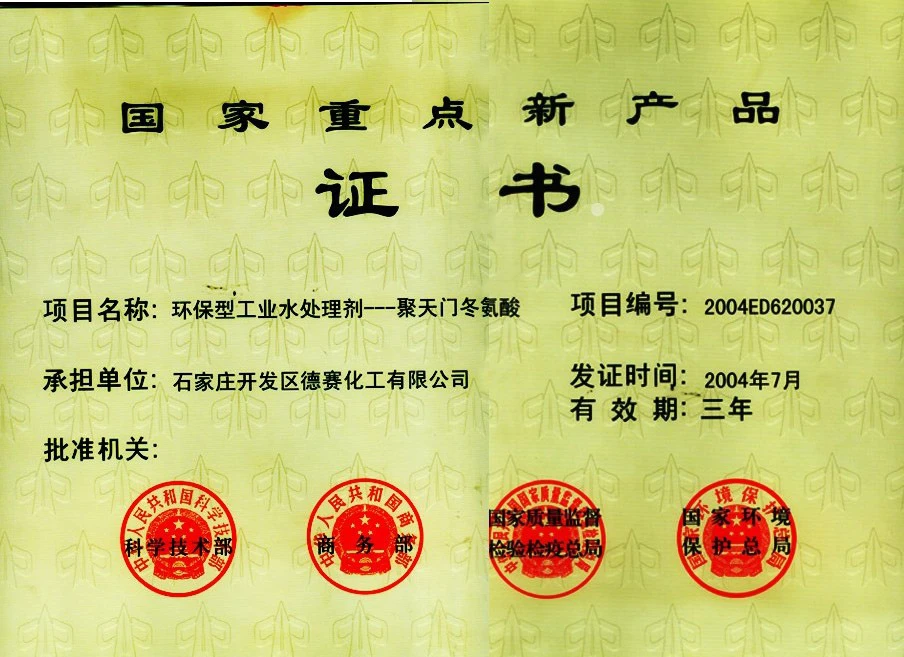
News
11月 . 10, 2024 01:06 Back to list
Understanding the Role of EDTA as a Chelating Agent for Iron in Solutions
EDTA-Fe Chelate A Comprehensive Overview
The chelation process is a fascinating aspect of chemistry, playing a vital role in various fields, including agriculture, medicine, and environmental science. One of the most widely studied and utilized chelating agents is ethylene diamine tetraacetic acid (EDTA), particularly in its complex with iron, known as EDTA-Fe chelate. This article delves into the properties, applications, benefits, and significance of EDTA-Fe chelate.
What is EDTA?
EDTA is a synthetic compound that acts as a powerful chelating agent. It has the ability to bind metal ions, such as calcium, magnesium, and iron, forming stable complexes that prevent these metals from precipitating out of solution or reacting with other substances. This property makes EDTA invaluable in various applications, such as medicine, where it is used to treat heavy metal toxicity and in laboratory settings for the analysis of metal ion concentrations.
The Importance of Iron in Plants
Iron is an essential micronutrient for all living organisms, including plants. It plays a critical role in photosynthesis, respiration, and nitrogen fixation. Plants require iron in its ferrous form (Fe²⁺) for optimal growth and development. However, due to factors such as soil pH, iron availability can be limited. In alkaline soils, iron can become bound to other compounds, making it less accessible to plants. This is where EDTA-Fe chelate becomes crucial.
EDTA-Fe Chelate and Its Role in Agriculture
EDTA-Fe chelate is a formulation that incorporates iron ions bound to EDTA. This complex enhances the bioavailability of iron for plants. By providing iron in a form that is easily absorbed, EDTA-Fe chelate helps to prevent and correct iron deficiency in crops, which is vital for maintaining healthy growth and maximizing yields. This application of EDTA-Fe chelate is particularly significant in horticulture and agriculture, where iron deficiency can lead to chlorosis—a condition characterized by yellowing leaves and stunted growth.
Benefits of Using EDTA-Fe Chelate
edta fe chelant

1. Enhanced Nutrient Availability One of the primary advantages of using EDTA-Fe chelate is its ability to maintain iron in a soluble state, even in high pH environments. This ensures that plants receive the necessary nutrients to thrive, promoting vigorous growth and improving crop quality.
2. Reduced Toxicity Risks EDTA’s binding properties help reduce the toxicity of heavy metals in soil, making it a useful tool to detoxify contaminated land. It captures harmful metals and minimizes their availability to plants, thereby enhancing soil health.
3. Versatility of Application EDTA-Fe chelate can be applied through various methods, including foliar sprays, soil drenches, and fertigation systems. This flexibility allows farmers and horticulturists to choose the best application method for their specific needs.
4. Long-lasting Efficacy The stability of the EDTA-Fe complex allows for prolonged availability of iron to plants. This longer duration of action makes it an efficient choice for addressing iron deficiency over extended periods.
Environmental Considerations and Sustainability
While EDTA-Fe chelate offers many benefits, there are environmental considerations associated with its use. The application of synthetic chelating agents can lead to concerns about soil health and groundwater contamination. As a result, researchers are exploring biodegradable alternatives and the development of natural chelating agents. This is aimed at mitigating potential environmental impacts while maintaining agricultural productivity.
Conclusion
EDTA-Fe chelate represents a significant advancement in agricultural chemistry, addressing the crucial need for iron in plant nutrition. By enhancing the availability of this essential micronutrient, it supports healthier crop growth and higher yields, ultimately contributing to food security. As we continue to navigate the challenges of modern agriculture, understanding and utilizing chelating agents like EDTA-Fe will be pivotal in promoting sustainable farming practices and improving environmental health. With ongoing research and innovation, there is potential for even more effective and environmentally friendly options to emerge in the field of chelation chemistry.
-
Polyaspartic Acid Salts in Agricultural Fertilizers: A Sustainable Solution
NewsJul.21,2025
-
OEM Chelating Agent Preservative Supplier & Manufacturer High-Quality Customized Solutions
NewsJul.08,2025
-
OEM Potassium Chelating Agent Manufacturer - Custom Potassium Oxalate & Citrate Solutions
NewsJul.08,2025
-
OEM Pentasodium DTPA Chelating Agent Supplier & Manufacturer High Purity & Cost-Effective Solutions
NewsJul.08,2025
-
High-Efficiency Chelated Trace Elements Fertilizer Bulk Supplier & Manufacturer Quotes
NewsJul.07,2025
-
High Quality K Formation for a Chelating Agent – Reliable Manufacturer & Supplier
NewsJul.07,2025
